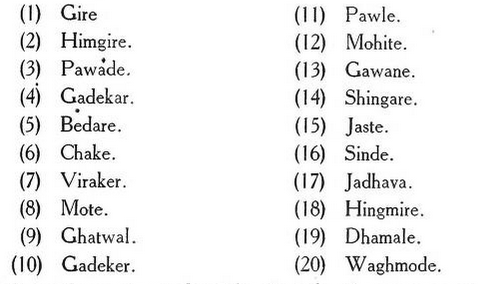Pangul: Deccan
Contents |
Pangul
This article is an extract from THE CASTES AND TRIBES OF H. E. H. THE NIZAM'S DOMINIONS BY SYED SIRAJ UL HASSAN Of Merton College, Oxford, Trinity College, Dublin, and Middle Temple, London. One of the Judges of H. E. H. the Nizam's High Court of Judicature : Lately Director of Public Instruction. BOMBAY THE TlMES PRESS 1920 Indpaedia is an archive. It neither agrees nor disagrees |
Pangul — a small caste oi* Maratha beggars and buffalo-dealers, found scattered 'all over the Maratha country. They represent them- selves to be descended from a lame man (Mar-Pangla) who, in ful- filment of a vow, Wcis devoted to the service of Mahadeva by his parents. They seem to be an off-shoot from the Maratha Kunbis, whom they resemble in physical character and habits. They have no sub-divisions. Their exogamous sections, modelled upon those of the Maratha Kunbis, are as follows : —
Their marriages are regulated by the rule of exogamy common to all the Maratha castes. A man may not marry a woman belong- ing to his own section nor one who falls within the prohibited degrees of kinship.
Marriage
Panguls practise both infant and adult marriages and allow polygamy without imposing any limit on the number of wives a man may have. Sexual indiscretions before marriage are leniently dealt with. Widows may marry again and enjoy full freedom in their choice of a second husband. Divorce is permitted for adultery and divorced wives may marry again by the same rites as widows. The marriage ceremony is performed in accordance with the orthodox usage. After the bride has been selected and the bride-price paid, the actual wedding is celebrated under a booth made of nine posts. 'Antarpat' and 'Homa' eire believed to be the binding portion of the ceremony. Brahmins officiate as priests at their marriages.
Religion
The religion of Panguls shows little divergence from the standard form current among other Maratha castes. Khandoba and Bhavani are their favourite deities to whom offerings are made on festive occasions. The former is worshipped with great ceremony on *Sati,' or the light sixth of Margashirsha (Decdnber), and the latter, on Dasera day, or the light tenth of 'Aswin' (October^. 'Birs' and 'Munjyas' or spirits of adult and child ancestors, are represented by silver embossed plates and by circular vermilion balls respectively, and worshipped every day by the members of the caste. Brahmins serve them as priests on ceremonial and religious occasions. They keep Hindu festivals and make pilgrimages to Tuijapur, Pandharpur and other holy shrines in the Deccan. The dead are both buried and burnt and the ashes are collected on the third day after death and thrown into any sacred stream. Mourning is observed for ten days and 'Sradha' ceremony is performed on the 10th day after death. On the 12th day a funeral feast is provided to the caste people. An- cestors in general are propitiated on Pitra Amawasya, or the last day of Bhadrapad (September).
Social Status
In point of social standing Panguls rank lower than the Maratha Kunbis, from whose hands they take Kachi. Their rules regarding diet are the same as those of Maratha Kunbis. They eat fish and the flesh of fowls, sheep, hare and deer and drink spirituous and fermented liquors.
Occupation
Begging is believed to be the original occupation of the caste, although some Panguls style themselves as 'gawalis' (herdsmen) and deal in buffalos and their milk. They are, however, precluded, on pain of social degradation, from selling cow's milk. Their mode of beginning the day is rather uncommon. Early in the morning the Pangul spreads his blankets at the foot of a tree and get- ting high up on a branch calls out loudly the names of Vithoba and other Hindu gods shouting for alms to the passersby. He gels down from the tree at 10 a.m., collects the alms and returns home. Often the Panguls are seen early in the morning wandering through the streets, calling out the names of gods and collecting alms in their names. Some of the Panguls have now become petty traders and cultivators. They have a caste panchayat to which all social dis- putes and intricate questions are referred for solution.
